June 2023 marked the 25th Anniversary of Gramercy! Thank you to our valued investors, trusted business partners and team members without whom this milestone could not have been reached. We are excited for the opportunities we see ahead, and look forward to continuing to deliver upon our mission to have a positive impact on the well-being of our clients, portfolio investments (and their communities) and our team members.
Contents
Market Overview
Macro Review
Inflation stubbornness has already removed the risk of a March interest rate cut. A Federal Reserve cut in May is now even more uncertain. Those Fed officials who sought more disinflationary progress got the opposite. The Fed’s Goolsbee also reminded markets that he doesn’t believe that the last mile of the inflation fight is the hardest. A similar tone was struck by ECB officials. However, Goolsbee also reminded markets that the Fed’s inflation goal is based on PCE and not CPI. The “inflation wedge” between the two metrics continues to grow wider, yet the market is following headline CPI and ignoring the PCE progress. Instead, there is a debate whether the sell-off in core rates has now gone too far. After all, retail sales were weak across the board and contracted -0.8% with the December reading revised lower. For now, we continue to ride the “no landing” wave, even if questions are being asked. Large-scale M&A is back in the foray as Diamondback seeks to acquire Endeavor Energy for $25bn. The U.S. regional bank index rose by almost 3% this week as contagion cooled, and as the Russell 2000 retraced and struck a new YTD high after recording its worst two-day streak since June 2022. The mixed data out of the U.S. caused the Atlanta Fed GDP NowCast for 1Q to decline from 3.4% to 2.9%, which is still a strong run-rate when the IMF forecasted 2.1% for 2024. Escalation in the Middle East between Israel and Lebanon was initially ignored, as U.S. crude inventory data weighed on oil prices, but the prospects of no ceasefire in Gaza caused some volatility. Equally, the move higher in soft commodities as a theme in 2024 began to ease with cocoa ending the week down 2%, which has been subject to extreme weather patterns denting the delicate crop cycle. Elsewhere, Japan and the UK recorded sequentially weaker GDP and registered technical recessions. Across EM, Indonesia’s election was in-line with expectations but now exposes more fiscal risks. Pakistan’s PTI are seeking to form a coalition and have put forward a prime ministerial candidate. Peru’s economic activity surprised to the downside as the Central Bank cut rates and the government reshuffled the cabinet. Ghana also replaced its Minister of Finance. The move was seen as a delay to the country’s sovereign restructuring, rather than an attempt to scupper the plan altogether. Finally, Chile’s Central Bank minutes revealed support for larger rate cuts going forward.
EM Credit Update
Emerging market sovereign credit (cash bonds) ended the week up 0.1% with credit spreads 6bps tighter. Sovereign outperformers were Argentina, Ukraine and Kenya, while Venezuela, Ghana and Bolivia underperformed. Kenya issued a 7-year bond at 10.375% and tendered $1.44bn of its June 2024 Eurobond. Sovereign bonds with double-digit coupons are still very rare constituents of the EM bond universe. Across the 15 countries that have issued Eurobond debt with a coupon at or above 9.5%, six have ended up in default since 2008, meaning it is not always a positive development.
The Week Ahead
Fed and ECB minutes are key events that will shape the course of next week. The PBoC rate decision is also a key event, with other EM interest rate decisions due from Indonesia (6.0%), South Korea (3.5%) and Turkey (45.0%). Inflation updates are due from South Africa, while GDP growth data is expected from Peru. Fiscal policy takes center-stage in South Africa next week with the Medium-Term Budget Policy Statement (MTPBS). Finally, given geopolitical risk events, there could be additional focus on the 60th Munich Security Conference.
Highlights from emerging markets discussed below: Kenya’s Eurobond issuance materially reduces liquidity risk for the sovereign; Pakistan Government formation underway; Passing of VAT hike brings Ecuador closer to renewed IMF financial support; Indonesian election outcome points to likely policy continuity; Ghana bondholder negotiations to continue under new Finance Minister and Peru’s new Finance and Energy Ministers unlikely to alter outlook.
Fixed Income
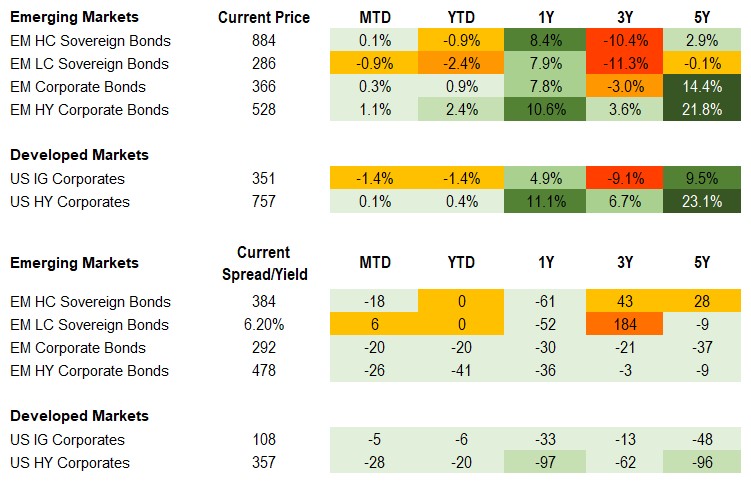
Equities
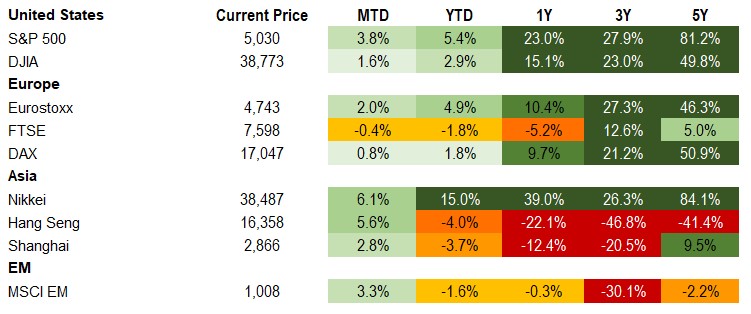
Commodities

Source for data tables: Bloomberg, JPMorgan, Gramercy. EM Fixed Income is represented by the following JPMorgan Indicies: EMBI Global, GBI-EM Global Diversified, CEMBI Broad Diversified and CEMBI Broad High Yield. DM Fixed Income is represented by the JPMorgan JULI Total Return Index and Domestic High Yield Index. Fixed Income, Equity and Commodity data is as of February 16, 2024 (mid-afternoon).
Emerging Markets Weekly Highlights
Kenya’s Eurobond issuance materially reduces liquidity risk for the sovereign
Event: Following in the footsteps of fellow Sub-Saharan African credits such as Benin (B1/B+/B+) and Cote d’Ivoire (Ba3/BB-/BB-) that recently placed Eurobonds, the Government of Kenya (B3/B/B) returned to international capital markets after a 2.5-year hiatus with a $1.5bn security at a 9.75% coupon and effective yield at issuance of 10.375%.
Gramercy Commentary: Despite the high coupon on the new bond, we see Kenya’s return to capital markets as a credit-positive development that materially improves the sovereign’s external debt service profile in the near term. The government is set to use the proceeds to buy back around two-thirds of its $2bn Eurobond maturing in June 2024 at par. The sizable maturity lump looming in mid-2024 has been at the center of both domestic and international investors’ concerns about Kenya’s credit story this year. We believe that its removal is likely to produce a significant positive “feedback loop” that should be supportive for Kenyan assets across the board and for overall macroeconomic stabilization in conjunction with continuation of IMF-mandated reforms. Notably, in weighted-average terms, the overall interest burden for the sovereign might actually decrease as fresh external financing “crowds out” more expensive domestic debt and is likely to lower the sovereign’s borrowing costs in local markets.
Pakistan Government formation underway
Event: Following last week’s election, the incumbent Pakistan Muslim League Nawaz and Pakistan People’s Party won 75 and 54 seats, respectively while Khan backed independents garnered 92 seats. With military influence, the PML-N and PPP are in the process of forming a governing coalition with other regional parties and Shehbaz Sharif as likely Prime Minister. Omar Ayub Khan will contest for the post against Sharif with the parliamentary vote date yet to be announced. Khan’s party has called for protests on February 17th. Meanwhile, the interim cabinet endorsed previously proposed gas hikes that should align with the existing IMF SBA program.
Gramercy Commentary: We expect a noisy government formation process ultimately under Shehbaz Sharif to continue over the coming weeks with room for political protest and social unrest. Once cabinet members are announced and in place, we anticipate meetings between the new government and the IMF to commence by April. Despite the electoral volatility, the continued progress on tariffs and related performance criteria through December should pave the way for the final $1.1bn disbursement under the current SBA. While we continue to see prospects for a new program, negotiations could be more prolonged with higher execution risk given the Government’s weak popular mandate and latent risk of defection within the military.
Passing of VAT hike brings Ecuador closer to renewed IMF financial support
Event: Late last week, the National Assembly failed to muster the votes required to override President Noboa’s Executive Action to increase Ecuador’s Value Added Tax (VAT) permanently by 1ppt to 13% and reserve the right to hike it further to 15% depending on budgetary conditions.
Gramercy Commentary: President Noboa’s VAT reform is credit-positive for the sovereign from two perspectives: i) estimates suggest it could generate up to 1% of GDP in additional revenues this year, helping to reduce the budget gap; and ii) it should take Ecuador a step closer to signing a new deal with the IMF. Recently the authorities formally announced that they are in the process of negotiating a program with the Fund. The IMF has signaled that it stands ready to support Ecuador as long as the government is able to deliver the fiscal consolidation deemed necessary. Now that the VAT hike will become law (in April), a successful conclusion of talks with the IMF seems to be on the horizon. Meanwhile, amid his “internal armed conflict” against organized crime, President Noboa has called a referendum on security issues that will also take place in April. A successful outcome would reinforce the President’s strong political standing anchored by 80% approval ratings and his Administration’s improved governability as signaled by progress on socially challenging reforms on the road to a new IMF program.
Indonesian election outcome points to likely policy continuity
Event: At the time of writing, quick poll counts suggest current President Jokowi backed candidate and former general, Prabowo Subianto, should win the Presidential Election by a comfortable margin (59% support vs. Anies Baswedan at 25% and Ganjar Pranowo at 16%), avoiding a run-off vote in June. Prabowo’s political coalition appears to have obtained 43% of parliamentary seats up from 39% in 2019 elections. The official election result will be announced on March 20th and the new government will be sworn in on October 1st.
Gramercy Commentary: Prabowo will likely continue much of President Jokowi’s industrial agenda with a high growth target of 6-7% and focus on the mineral processing industry, manufacturing sector and infrastructure development. Given the lack of majority in parliament, Prabowo’s political consolidation between March and October will be important to monitor. We expect looser fiscal accounts under Prabowo although we still foresee relatively pragmatic cabinet appointments. A comparatively strong starting fiscal position with debt to GDP of 40% and a deficit of just under 2% of GDP in addition to a current account in balance or small surplus should keep any negative rating actions at bay in the first half of his term.
Ghana bondholder negotiations to continue under new Finance Minister
Event: President Nana Akufo-Addo reshuffled his cabinet this week, notably replacing Finance Minister Ken Ofori-Atta with the current Minister of State for Finance, Mohammed Amin Adam along with 12 other minister changes. Adam has vowed to remain committed to the IMF program and ongoing reforms in the energy and financial sectors.
Gramercy Commentary: From a policy perspective, we do not expect a significant change relative to leadership under Ofori-Atta with a continuation of relatively smooth IMF relations and program performance. It remains unclear if Adam will be more amenable to more complex restructuring terms desired by external bondholders than had been strongly opposed by Ofori-Atta. While Adam has been part of the overall negotiation process, the timing of the change still increases the likelihood of a delay beyond March. Incentives for resolution by mid-year comfortably in advance of the December election remain intact perhaps with higher likelihood for success if timed or structured so that external payments do not resume until post-election.
Peru’s new Finance and Energy Ministers unlikely to alter outlook
Event: President Boluarte reshuffled her cabinet and appointed Jose Arista to replace Alex Contreras as Economy and Finance Minister and Romulo Mucho to replace Oscar Vera Gargurevich as Minister of Energy and Mines. The changes followed growing speculation over Contreras’ departure as well as opaque details on support for Petroperu.
Gramercy Commentary: Arista has worked for several different administrations and is a market-friendly appointment who may have incrementally more political capital to execute policy. Similarly, Mucho was Deputy Mines Minister under Toledo and has social conflict experience, leaving him marginally better positioned to renew efforts to attract investment in the mining sector. Support for Petroperu will likely remain limited with a continued push to improve performance and governance. More broadly, significant structural reforms will remain largely stalled and approval of new pension withdrawals is still possible later this month. For now, protests and unrest demanding early elections have receded, albeit the Administration’s overall low approval ratings and still sluggish economic conditions could drive a resurgence of this topic later this year.
Emerging Markets Technicals
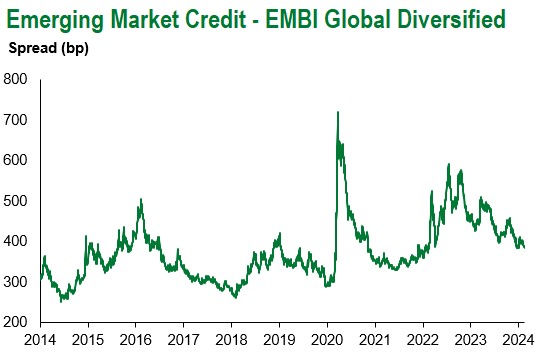
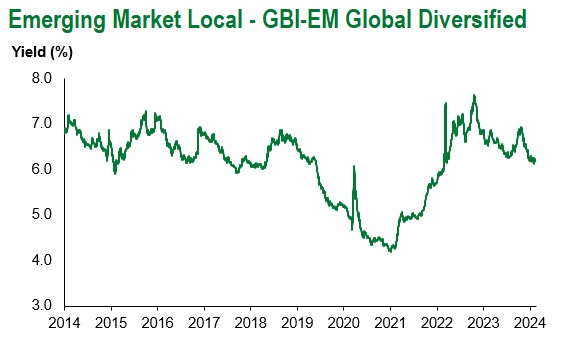
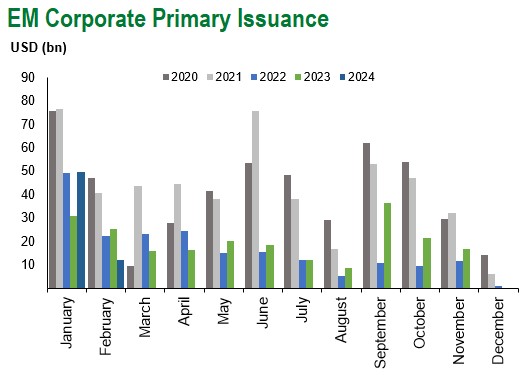
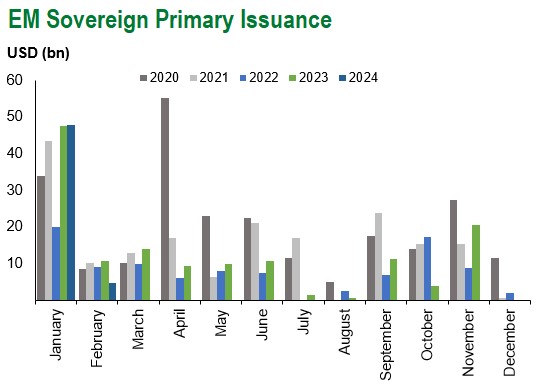
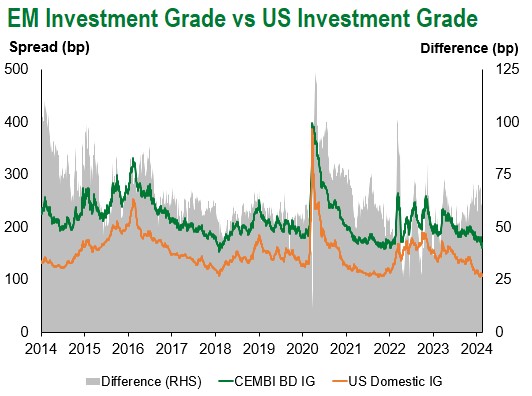
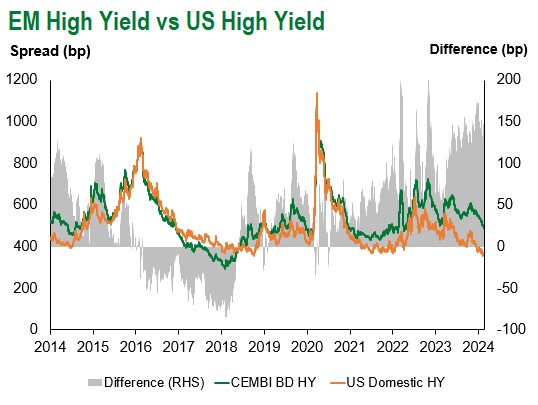
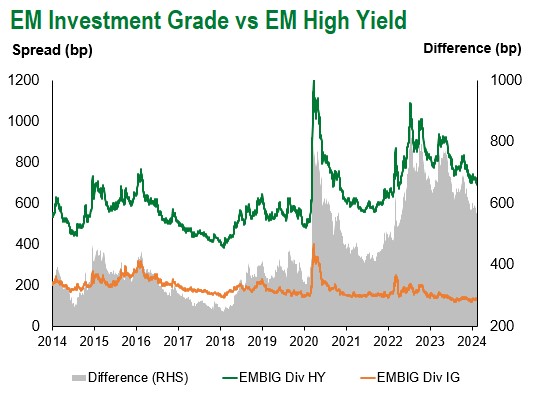
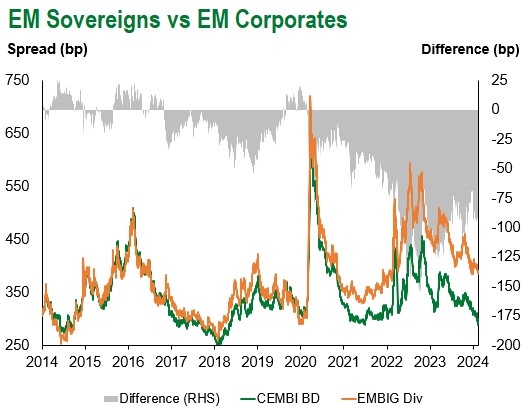
Emerging Markets Flows
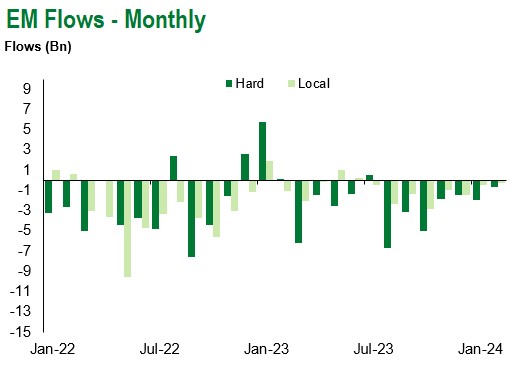
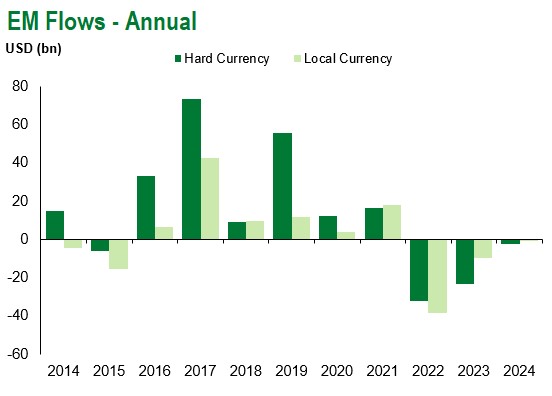
Source for graphs: Bloomberg, JPMorgan, Gramercy. As of February 16, 2024.
For questions, please contact:
Kathryn Exum, CFA ESG, Director, Co-Head of Sovereign Research, [email protected]
Petar Atanasov, Director, Co-Head of Sovereign Research, [email protected]
James Barry, Director, Deputy Portfolio Manager, [email protected]
This document is for informational purposes only. The information presented is not intended to be relied upon as a forecast, research or investment advice, and is not a recommendation, offer or solicitation to buy or sell any securities or to adopt any investment strategy. Gramercy may have current investment positions in the securities or sovereigns mentioned above. The information and opinions contained in this paper are as of the date of initial publication, derived from proprietary and nonproprietary sources deemed by Gramercy to be reliable, are not necessarily all-inclusive and are not guaranteed as to accuracy. This paper may contain “forward-looking” information that is not purely historical in nature. Such information may include, among other things, projections and forecasts. There is no guarantee that any forecasts made will come to pass. Reliance upon information in this paper is at the sole discretion of the reader. You should not rely on this presentation as the basis upon which to make an investment decision. Investment involves risk. There can be no assurance that investment objectives will be achieved. Investors must be prepared to bear the risk of a total loss of their investment. These risks are often heightened for investments in emerging/developing markets or smaller capital markets. International investing involves risks, including risks related to foreign currency, limited liquidity, less government regulation, and the possibility of substantial volatility due to adverse political, economic or other developments. References to any indices are for informational and general comparative purposes only. The performance data of various indices mentioned in this update are updated and released on a periodic basis before finalization. The performance data of various indices presented herein was current as of the date of the presentation. Please refer to data returns of the separate indices if you desire additional or updated information. Indices are unmanaged, and their performance results do not reflect the impact of fees, expenses, or taxes that may be incurred through an investment with Gramercy. Returns for indices assume dividend reinvestment. An investment cannot be made directly in an index. Accordingly, comparing results shown to those of such indices may be of limited use. The information provided herein is neither tax nor legal advice. Investors should speak to their tax professional for specific information regarding their tax situation.
